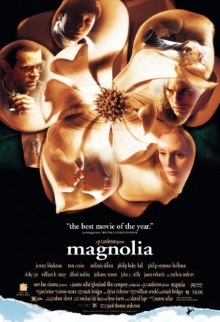
Paul Thomas Anderson is today considered one of America’s great directors. He was hailed as a wunderkind in the 1990s, his reputation forged by Boogie Nights and this very film. I note that through no active effort on my part, I have now watched almost all of his feature films that are released to date, which is pretty unusual for me. The only films I’m missing are his most recent one Inherent Vice and his debut film Hard Eight.
After the unexpected success of Boogie Nights, both critically and commercially, Anderson was apparently given carte blanche to do anything he wished. Magnolia was the result. At over three hours long and with an ensemble cast of notable stars, including Tom Cruise, Philip Seymour Hoffman, Julianne Moore, John C. Reilly and many more, it’s certainly epic in scope. These resources are used to tell multiple stories that are only loosely connected to one another, though they all occur at the same time and in the same city.
Probably the most eye-catching of these stories is Cruise’s stint as Frank Mackey, a prominent coach in what is today known as the pick-up artist community. He’s every bit as loathsome as you’d expect. The film reveals his lying and perhaps his misogyny as stemming from his broken childhood and incredibly ends with the audience feeling some measure of sympathy for him. I’m not sure if this is Cruise’s best performance ever, but it’s surely one in which he plays most against his usual heroic type and he does so with aplomb. It must have taken Cruise a great deal of courage to play a character who is so vile that he threatens to drop-kick pet dogs and I’m convinced that Cruise’s nudity in this film is a deliberate callback to his debut role in Risky Business.
About as good is the bit about Stanley Spector, a well-read young boy who participates in a quiz-based television game show. He and his team are on route to break the record for decades-long show for longest winning streak ever but it’s clear that his father cares only for the fame and fortune that will result. Even his fellow child contestants are cynically mercenary types intent on banking on their celebrity-hood. Other stories are markedly weaker. John C. Reilly plays a police officer who is smitten by a woman when he visits her house for a noise disturbance call. William H. Macy plays a middle-aged man who was once famous as a child contestant in the same game show but has since never made anything of his life.
Much has been written about the similar themes that recur in each of these stories: regrets over deeds done long ago, guilt, the failures of parents etc. I feel however that the associations are too loose to base any firm conclusions about any deeper meaning. I am amused as all this academic writing serves to further deepen my impression that Anderson is particularly beloved by academic film critics. What is undeniable is that this film is an excellent showcase for the technical aspect of Anderson’s directing skills, in particular his eye for color and composition. His montages skip from scene to scene so quickly that you’re left breathless, yet you never get the sense that Anderson has lost control and instead you’re simply carried along by the energy of the film. The music here is also highly prominent and serves as an additional way to join the stories together, though I have to say the montage of them all singing along to the same song feels a bit silly.
Soon after the release of Magnolia, Anderson apparently commented that he felt it would be the best movie he could ever make. I think that There Will Be Blood and The Master showed that he was wrong. Magnolia is a good film but it doesn’t hold a candle to these later two films. Anderson is smart enough to avoid making the film a platform for a single trite message (a mistake that the later Crash, with its similar structure, made) but without a strong unifying theme, there’s nothing to really tie the individual stories together and not all of the stories are equally strong. I did however love the frog-raining scene and how it adds an element of the whimsical to the film, preventing it from being weighed down too much by the sappy scenes.
Even though it isn’t Anderson’s strongest work, Magnolia is very much an enjoyable and enthralling watch in its own right. Cruise’s performance as Mackey alone is worth the price of admission and arguably the film has done the whole world some lasting good by drawing the public’s attention to this slimy industry.